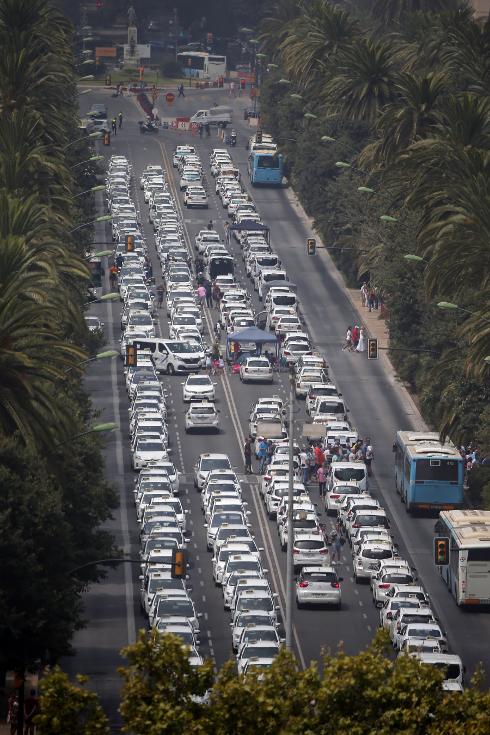

Sections
Highlight

SUR
Friday, 3 August 2018, 18:43
Compartir
The taxi strike that has affected holiday-season travel across most of Spain for much of the last week ended on Wednesday night after government assurances that it would address the sector's grievances in September.
However a spokesperson for the Élite Taxi union in Barcelona, where the strike had begun, said that they would "start World War Three" if their demands weren't met by then.
The industrial action, against the rise of private-hire firms like Uber and Cabify, began in Barcelona last week and spread to other areas, including Malaga city and the Costa del Sol. While passenger journeys in Barcelona, Madrid and other places were disrupted by complete stoppages, in Malaga province a partial service was maintained, limiting its impact.
Business as usual at airport
On the Costa, taxi drivers voted on Sunday to joint the stoppage, reducing the numbers working to around half but maintaining a full service at Malaga Airport so as "not to inconvenience" travellers arriving at a peak time of year. This contrasted with a lightning strike a year ago over the same issue of private-hire cab licences, when the airport taxi rank was closed, causing severe criticism on all sides.
This time round the biggest local impact was felt on the main Avenida del Parque, near to city hall in Malaga, where drivers spontaneously blocked private vehicles from using it during most of Tuesday and Wednesday but without taxi unions' support.
Taxi drivers, both locally and nationally, are unhappy about the number of licences given out to private-hire vehicles (or VTCs as they are known in Spain). Faced with the increased presence of companies like Uber and Cabify, the drivers feel that the newcomers are not as regulated and provide unfair competition. Uber launched on the Costa del Sol this summer and Cabify has increased its local fleet recently.
Demand to reduce licences
The law says that only one new VTC licence can be given out in an area for every 30 existing taxi licences, but the current ratio in Spain is around one in 10, and even lower in some areas, as a result of a deregulated period from 2013-2015.
Taxi drivers are demanding the ratio is reduced to match the law and want to see regulation of VTCs passed to the regional governments and not centralised in Madrid. Barcelona's mayor had also proposed that local councils could take on extra regulatory powers over the VTCs, a move which was overturned by judges, sparking the initial strike in Barcelona last week.
On the Costa del Sol, there were several reports of incidents of attacks on Uber and Cabify drivers last week and taxi unions condemned them. In Marbella two women were allegedly injured near the bus station when a Cabify car was attacked.
Between Monday and Wednesday this week, the national government met with all sides in the dispute to discuss its proposals to devolve regulatory responsibility of private-hire VTCs like Uber and Cabify to the regions, in response to taxi drivers demands. However, ministers claimed that the necessary legislation to carry this out takes time and cannot be done during the August holiday period.
By Wednesday night the taxi drivers' representatives had accepted the vague assurances of the government to solve the problem in September, although they explained that they would plan more concerted and organised industrial action if no solution was reached by then.
Publicidad
Publicidad
Publicidad
Publicidad
Reporta un error en esta noticia
Necesitas ser suscriptor para poder votar.